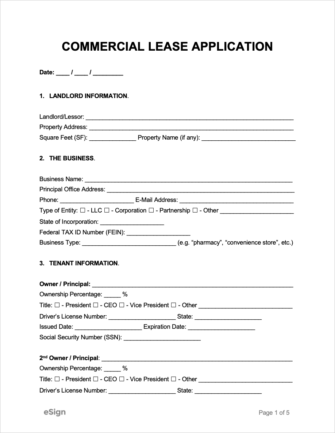

A commercial lease application contains information on an applicant seeking to rent non-residential space in addition to giving consent to the landlord to perform various background checks. The application serves as the first step a renter takes in having a new physical location for their business. Unlike a residential application, the landlord’s focus is more on the financial stability of the company instead of the individual themselves, as a successful business almost always translates into a worthwhile tenant.
Commercial lease agreement – A legally binding form used to set the terms of a tenant’s commercial rental lease, including rent payments, term length, and other conditions.

In overview, a commercial lease application covers the following components:
In regards to a tenant’s business, there is little that is off limits in regard to what a landlord can ask. However, when screening the individual applicant, there are certain types of information that are completely off limits. This can include the applicant’s nationality, religious affiliation, gender, sexual orientation, age, and other aspects that don’t correlate to whether the tenant will uphold to the requirements of the lease.
If the landlord uncovers any of the following during the application process, they would be wise to consider rejecting the applicant.
There are three (3) common reasons a tenant would be cautious about signing a lease for 5 to 10 years. The first scenario is that they anticipate their business will grow so fast that they’ll need to relocate to a larger space. The second reason is that they’re not confident in the future of their company. And the third situation could be that the tenant is not confident that the space will suit their needs.
Unless the main tenant is exceptionally wealthy, landlords should avoid leasing to tenants that aren’t willing to provide 1 (one) or more guarantor. In the event the tenant can’t make rent payments, the landlord would have to pursue the due funds via formal eviction proceedings.